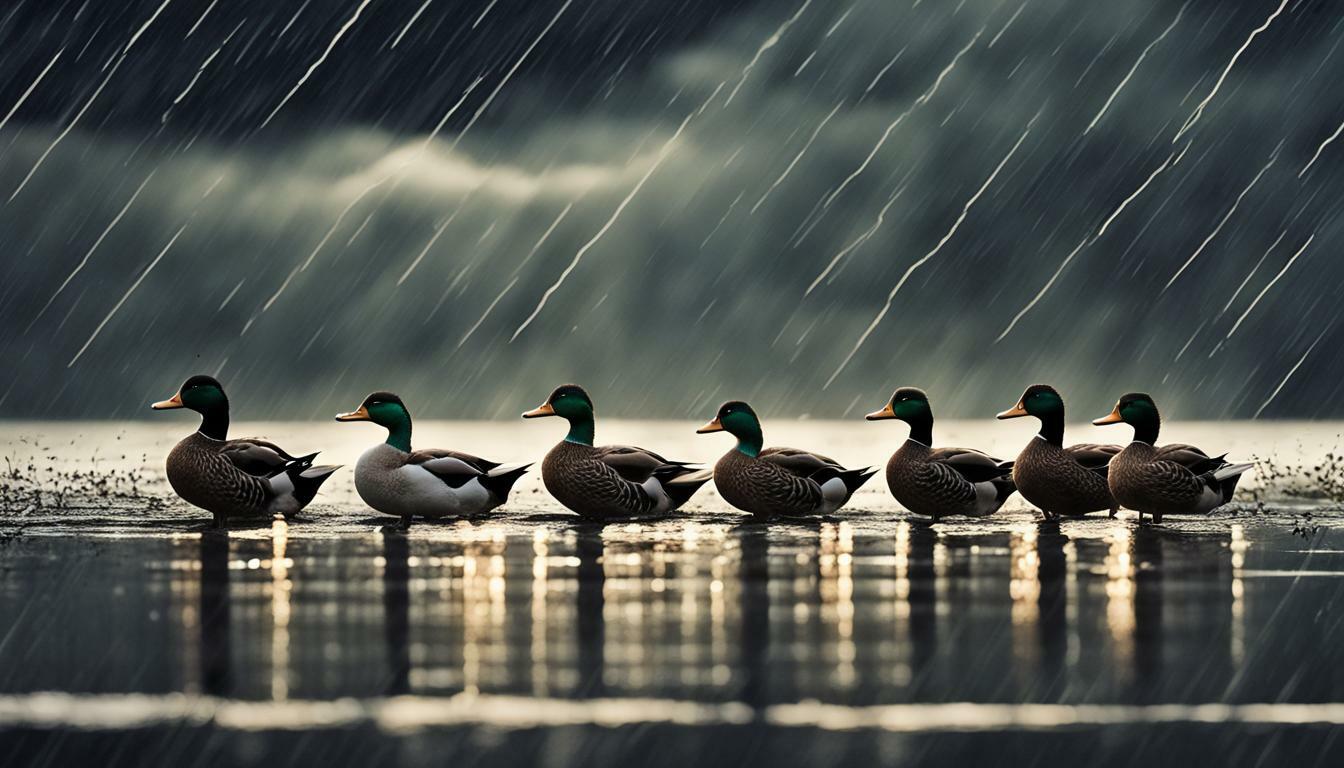Have you ever wondered if ducks enjoy rainy weather? Perhaps you’ve seen a group of ducks swimming in a pond during a downpour and wondered if they were seeking shelter or actually enjoying the rain. In this section, we will dive into the behavior of ducks in relation to rain and explore whether ducks have a preference for wet weather.
By understanding the adaptability of ducks in different weather conditions, we can appreciate their unique characteristics and behaviors. Let’s take a closer look at what makes ducks such interesting creatures when it comes to rainy weather.
Key Takeaways:
- Ducks are well-equipped to handle rainy conditions due to their natural adaptations.
- While some ducks may appreciate the rain for its benefits, others may seek shelter during inclement weather.
- Understanding duck behavior in rain allows us to appreciate the unique adaptability of these fascinating creatures.
Duck Behavior in Rain
When it comes to wet weather conditions, ducks are well-equipped to thrive. Their natural adaptations enable them to deal with rain effectively.
Ducks have waterproof feathers that prevent water from penetrating through to their skin. They also have webbed feet that aid in swimming and walking on slippery surfaces. These adaptations make them well-suited to handle wet conditions.
Ducks often find shelter during heavy rain by hunkering down under trees or other objects that offer protection from the elements. They also forage for food in the rain, taking advantage of the abundance of insects and other small creatures that emerge during wet weather.
Overall, duck behavior in rain is a testament to their ability to adapt to changing weather conditions. While they may seek shelter during particularly heavy rain, they are generally well-equipped to deal with wet weather.
The Love Affair Between Ducks and Water
Have you ever wondered why ducks seem to love water so much? It’s no secret that ducks have a natural affinity for bodies of water, whether it’s a small pond or a large lake. In fact, water is not only a habitat for ducks, it’s also crucial to their survival.
Ducks are equipped with specialized body parts to help them navigate water with ease. Their webbed feet act like paddles, allowing them to swim swiftly through the water. Additionally, their waterproof feathers keep them warm and dry while floating on the water’s surface.
But water is not only used for swimming. Ducks also use water for bathing, which helps them clean and maintain their feathers. By preening their feathers while in the water, they ensure that their feathers remain waterproof and aerodynamic. Additionally, ducks use water as a source of food. They dive headfirst into the water to reach underwater plants and small fish, which make up a significant portion of their diet.
Wet weather conditions are not a hindrance for ducks either. In fact, ducks seem to thrive in wet weather. Given their natural preference for water, ducks take advantage of rainy conditions to find new sources of food and water. Additionally, rainwater can help fill up ponds and lakes, creating new habitats for ducks to thrive in.
As you can see, water plays a crucial role in the lives of ducks. From swimming to finding food, water is an integral part of a duck’s survival. By understanding the connection between ducks and water, we can appreciate the unique adaptability of these fascinating creatures in wet weather conditions.
Do Ducks Enjoy Rain?
As we’ve explored, ducks are well-equipped to handle rainy weather thanks to their natural adaptations such as waterproof feathers and webbed feet. But do they actually enjoy the rain?
Scientific research suggests that ducks have mixed feelings about rain. Some studies have shown that ducks may enjoy the rain because it makes it easier for them to find food and water sources. For example, during rainy weather, worms and insects come to the surface, making them more accessible to ducks. Additionally, rain can create temporary pools of water, which ducks can use for bathing and swimming.
On the other hand, some ducks may seek shelter during inclement weather, indicating that they may not enjoy being directly exposed to the rain. It’s also important to note that different species of ducks may have varying preferences when it comes to rain.
Ultimately, whether or not ducks enjoy the rain is subjective and can depend on a variety of factors such as the weather conditions, available resources, and individual preferences. However, it’s clear that ducks have evolved to thrive in wet weather conditions and have adapted to make the most out of rainy situations.
Conclusion
Now that we have explored the behavior of ducks in relation to rain, it is clear that these fascinating creatures have a unique adaptability to wet weather. While ducks have natural adaptations to handle rain, such as waterproof feathers and webbed feet, their enjoyment of rain is subjective.
Some ducks may appreciate the rain for its benefits, such as easier access to food and water, while others may seek shelter during inclement weather. Understanding duck behavior in rain allows us to appreciate the unique adaptability of these fascinating creatures and their connection to water.
Do Ducks Fly in the Rain?
Do ducks and rain the surprising truth: Contrary to popular belief, ducks can indeed fly in the rain. These versatile birds have waterproof feathers that keep them dry even in wet conditions. While they may seek shelter during heavy downpours, light rain doesn’t deter them from taking off and exploring their surroundings. Ducks are remarkably adapted to various weather conditions, making them resilient creatures of the natural world.
FAQ
Q: Do ducks like rain?
A: Ducks are well-adapted to wet weather and typically don’t mind the rain. Their waterproof feathers and webbed feet allow them to stay dry and maneuver easily in water. Some ducks may even enjoy the rain as it provides easier access to food and water.
Q: How do ducks adapt to rain?
A: Ducks have evolved various adaptations to cope with rainy conditions. Their feathers are coated with natural oils that repel water, keeping them dry. Their webbed feet help them navigate in water and muddy environments. Additionally, ducks may seek shelter in dense vegetation or under overhanging structures during heavy rain.
Q: What activities do ducks engage in during rainy weather?
A: Ducks utilize water for various activities, such as bathing, swimming, and finding food. Rain can provide them with easier access to bodies of water and increase their likelihood of finding food. They are also known to forage in wet environments, taking advantage of insects and other food sources that may be more abundant during rainy conditions.
Q: Do all ducks enjoy rain?
A: While ducks are generally well-adapted to handle rainy weather, their enjoyment of rain may vary. Some ducks may appreciate the benefits it brings, such as easier access to food and water. However, others may seek shelter during heavy rain or prefer drier conditions. It ultimately depends on the individual duck and its specific habitat and preferences.











